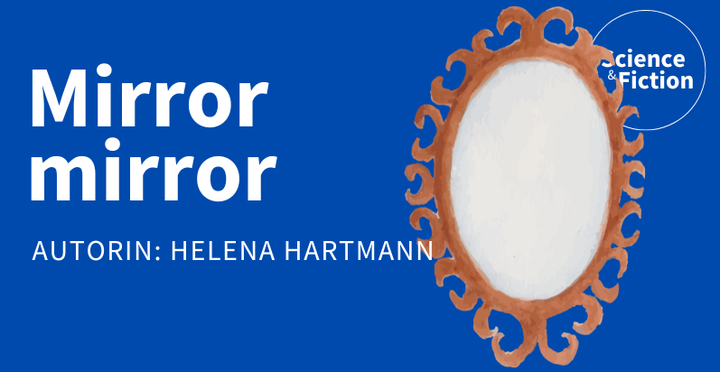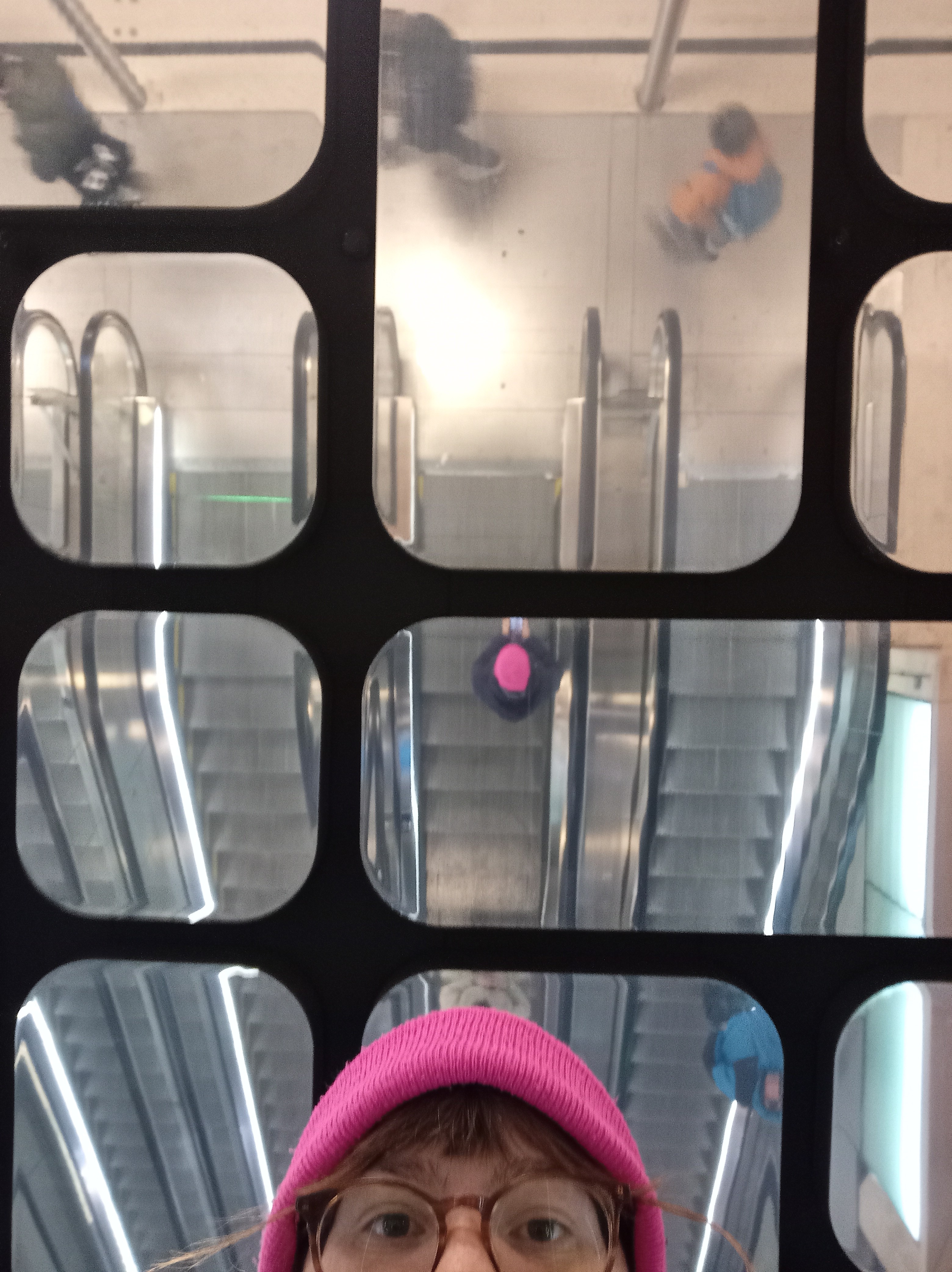
Who really are the people we see in the mirror?
Content warning
Injury
The short story
The station is busy, as always. She is out of breath and tired, because she carried her heavy backpack all the way here, having to walk because the bus didn’t come and she would have missed her train otherwise. Only to rush and upon her arrival find out it was delayed by an hour.
She looks around, for a place to sit or something else, not knowing what to do with all this newly acquired time on her hands. She sees a bench and navigates through the mass of people. Sits down, takes off her backpack and sighs. She has long stopped feeling frustrated or stressed by unexpected late trains or spontaneous waiting times. It only robs her of precious life hours, worrying about something she can’t control anyway.
Her gaze shifts over the hundreds of people rushing past her. So many of them, everybody on a different mission, different destination, different goal. A group of teenagers laughing over something on one of their phones. An older man audibly trying to hoist his suitcase on the escalators. A young couple walking hand-in-hand. She has time. Her head feels heavy.
She looks up at the ceiling, resting her head on the backpack next to her, observing the bustling crowd through the large ceiling mirrors that make the station seem like a never-ending labyrinth, overcoming the limited space of this world and extending into the sky. She catches a woman with a bright neon pink cap and bright blond hair in the mirror. She is beautiful, she thinks, watching the woman glide effortlessly along the mirror. She seems so confident, so happy. It reminds her of someone she would like to be friends with, or more. The woman disappears into one of the many shops of the station and out of her view. She keeps looking in the mirror, wanting to follow that woman’s footsteps, waiting for her to reappear. Her head is resting comfortably and cushioned on her backpack and she likes this new view of observing the world. She loves watching people in general, but this feels special. Seeing everyone through the mirror, like they’re different people. She dreamt about that once, smiling while thinking of the absurdity of the dream.
There the woman is again, coming out of the shop, a bag in her hand. She strolls through the station, slowly, with no particular aim. Lost in thoughts. Thoughts of what?, she wonders. The woman seems to have forgotten about her surroundings because she suddenly runs into a man on the phone who is also not paying attention. She must have bumped into him with quite some force, because the woman spreads her arms, can’t regain balance and falls to the ground. She can’t look away and her instincts immediately kick in. Before she can imagine the woman’s pain from falling or think that it might be good to get up and help her, she is already on her feet, letting go of the mirror view and looking in the direction where she expects the woman to be. “Are you okay…” she starts to ask, but trails off, because there is nobody there. A man walking by looks at her with a puzzled expression, probably asking himself why she is talking to herself in the middle of a busy train station.
Her head darts around. People all over the place but no sight of the woman with the pink cap. Not her, the one she desperately wants to meet and help. She still feels very uneasy, re-experiencing the fall of the woman. That must have really hurt. But where is she? Did she just imagine her, like the people in that dream? She looks back up, maybe her mind just played a trick on her. Or she misjudged the perspective of the mirror. Above her head, in the large all-mirrored ceiling, the woman is still struggling to sit up, from the ground, rubbing her arm which must have hit the floor while she was falling. The man she bumped into gestures with an annoying look on his face. Pah, no empathy from that guy, she thinks. She does not let go of the mirror view, afraid to lose the woman again. She still desperately wants to help but doesn’t know how.
And then the woman looks up. Up to their shared ceiling, their shared space, and their eyes meet. Hers are green and sparkle. Now, for the first time, she also consciously realizes that she does not see her own reflection in the mirror. Huh. “Damn”, the woman with the neon pink cap whose name she doesn’t know but would love to know, says. Her voice sounds very far away and very close at the same time. “You can see me?”, the woman asks. “Uhm, yes? Do you need help?” she replies immediately, without thinking that she is talking to a mirror aka herself in the middle of a train station. She looks around her and back up. And back down. And back up. “Something is not right …”, she mumbles, not wanting to say it fully for fear of sounding mad because this is exactly like in her dream.
“I’ve never met another one of us. So cool!”. “Another what?”, she asks. The woman smiles and reaches upwards. Reaches towards her. Gesturing for her to also reach out, to come. Come where? She can’t stop looking at the woman with her hand still suspended in mid-air, waiting to be gripped by her and only her. Now she can’t stop looking at the other people in the mirror who are doing the same thing the people next to her in her world are doing. But they’re different people. How did she never notive that before?! She stands up suddenly, in a trance, but not letting the woman in the ceiling mirror out of sight. The woman still stands there, smiling, her hand held out. “Hey, I don’t bite!, she laughs. Okay, what the hell. The train only leaves in about 50 minutes or so, right? She steps on top of the bench, holding onto her backpack, a bit unsteady on her feet. She stands upright but doesn’t reach the ceiling. The woman is still holding out her hand. She looks around her. Nobody’s paying any attention to her. The saying that someone is “in their own world” suddenly gets a completely new meaning. She starts to stretch out her hand. At first, nothing happens and she feels very stupid, for a few seconds. But then she feels a pull, very slightly, now stronger. She extends her arm fully, too curious not to try. She has completely forgotten about everybody else around her. The pull becomes stronger and she feels nauseous. Right before the train station, her train station, starts to blur and she closes her eyes, she feels the someone’s fingertips touching hers.
This story was originally written in English.

The paper
Hartmann, H., Riva, F., Rütgen, M., & Lamm, C. (2021). Placebo analgesia does not reduce empathy for naturalistic depictions of others’ pain in a somatosensory specific way. Cerebral Cortex Communications, 2(3), tgab039. https://doi.org/10.1093/texcom/tgab039
Connection between story and paper
The paper is about people empathizing with observing others in pain, in short: having empathy. It aimed to investigate whether we also use our own somatosensory cortex (which we need to process our own pain) to empathize with the pain of others. The authors wanted to find out if interfering with one’s own pain also changes one’s empathy, so whether these two processes are connected.
Forty-five participants were asked to rate their emotions when watching pictures depicting painful daily situations, for example somebody stepping on a hand or accidentally pouring hot coffee over it. Before doing so, they had received a cream on their right hand which was presented as a local anesthetic (in reality, this was a placebo gel without any pharmacological ingredients, and the authors used the placebo effect to make people feel less pain). Contrary to their expectations, participants’ empathy ratings nor their brain activity was not different when they rated pain of the same hand in pain that they had received this treatment on, compared to the other hand which acted as the control condition.
This was interpreted as the somatosensory cortex not necessarily being used in the same way when feeling pain vs. when empathizing. It might still be actively used to create feeling of empathy, but these feelings might be less dependent on how oneself can feel pain physically at that moment. The fictional short story takes us into a situation where we strongly empathize with someone who is not even there - or is in fact there, but in a different world.
What about you? Would you have reached up to the ceiling mirror?
The author
Helena has developed Science and Fiction and writes many of the stories herself. Her current research as an active scientist focuses on the behavioural and neural basis of pain, pain modulation and treatment expectations based on placebo and nocebo effects. She completed her PhD at the Social, Cognitive, and Affective Neuroscience Unit at the Institute for Psychology of Cognition, Emotion and Methods at the University of Vienna, where she investigated empathy and prosocial behaviour in the area of pain.